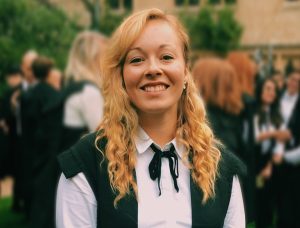Lily is a full-time student on the MSc Education (Child Development and Education) course. Before starting her Master’s at the department she studied Modern and Medieval Languages (French and German) at the University of Cambridge.
What degree did you apply for and why was it important to you to study this?
I applied to study the MSc in Child Development and Education, mostly because I had an interest not just in how children learn, but also in addressing disadvantage and working with families to support children’s development. The combination of theories of child development with the practical application of theory in the form of interventions – as well as the heavy focus on supporting disadvantaged groups – meant that this course appealed to me far more than any other Master’s course I had seen elsewhere.
What other opportunities have arisen through your studies at the department?
When I complete my Master’s, I plan to spend a year working in the Families, Effective Learning and Literacy research group within the department, where I will work on a variety of research projects related to child development and early childhood education.
What do you most value about the teaching at the department?
For me, the most valuable aspect of the teaching on the Master’s came from all the individual teachers who make up the teaching staff. Unsurprisingly, they all have remarkable expertise and knowledge in their fields, but more than that, they were all so supportive and willing to take the time to discuss and listen to students’ ideas to make sure that we got as much out of the course as we could.
Why do you think it’s important to study education?
Education has the potential to be such a positive force for social mobility by narrowing the gap between the more and less disadvantaged groups of society, and that’s particularly true early on in children’s lives. To me, studying the theories behind how this works is so crucial because it provides researchers with a framework on which to base interventions and programmes that work to create a more level playing field by supporting those who need it most.
What’s the community like at the department?
The department is such a lovely place to study because the atmosphere is so friendly, relaxed, and open. There is a perfect balance between feeling part of the smaller (somewhat more manageable!) group of people that make up your cohort of students on the Master’s pathway, as well as feeling just as much a part of the wider community (the teaching staff, the library staff, the higher degrees office, as well as other Master’s, PGCE, and PhD students) that makes up the whole department.
What has your degree taught you most?
When I think back to when I started the course, a year after graduating from my undergraduate degree in languages, I could not have fathomed just how useful the research component of the Master’s was going to be. Before I studied education, I had never considered working in academia, as I wanted to work to facilitate tangible positive change for children and young people on the ground. What I now realise is that that carrying out robust, usable, real-world research can have a genuine positive impact on children and families, and because of the training I received throughout my Master’s, I feel well-equipped to be able to do this as I begin my career in educational research.

